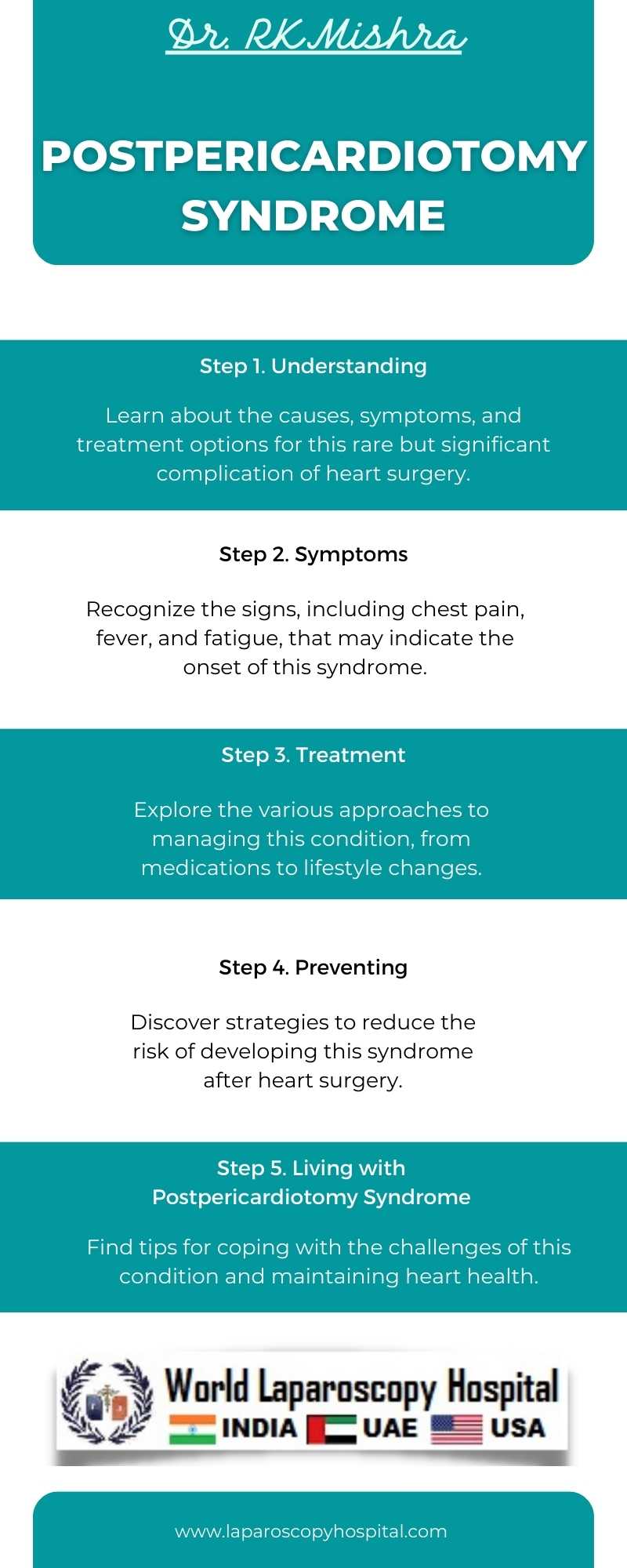Postpericardiotomy syndrome: Inflammation affecting the heart after cardiac surgery
Postpericardiotomy syndrome (PPS) is a well-recognized complication that can occur after cardiac surgery, particularly after procedures involving the opening of the pericardium, the sac surrounding the heart. It is characterized by inflammation of the pericardium and can manifest as fever, chest pain, and pericardial effusion. PPS typically occurs within weeks to months after surgery and can be a challenging condition to manage.

The exact cause of PPS is not fully understood, but it is believed to be related to an inflammatory response triggered by the surgery. The trauma to the pericardium during surgery may lead to an immune response, causing inflammation and the release of inflammatory mediators. This inflammatory process can result in the symptoms associated with PPS.
The clinical presentation of PPS can vary widely, ranging from mild symptoms to severe complications. Fever is a common feature of PPS and is often accompanied by chest pain, which can be sharp and worsen with deep breathing or lying flat. Pericardial effusion, the accumulation of fluid in the pericardial sac, can also occur and may lead to cardiac tamponade if not promptly treated.
Diagnosis of PPS is based on clinical findings, including symptoms of chest pain, fever, and pericardial effusion, as well as laboratory tests and imaging studies. Blood tests may show evidence of inflammation, such as an elevated white blood cell count or C-reactive protein level. Echocardiography can be used to visualize the pericardium and assess for the presence of pericardial effusion.
Treatment of PPS is aimed at managing symptoms and reducing inflammation. Nonsteroidal anti-inflammatory drugs (NSAIDs) are often used to control pain and inflammation, while colchicine may be used to prevent recurrences. In cases of severe or complicated PPS, corticosteroids or other immunosuppressive agents may be necessary.
The prognosis for patients with PPS is generally good, with most cases resolving spontaneously within a few weeks to months. However, complications such as cardiac tamponade can occur and may require urgent intervention. Close monitoring and prompt treatment are essential to ensure the best possible outcome for patients with PPS.
Conclusion:
PPS is a common complication of cardiac surgery that can present with a variety of symptoms. Early recognition and management are key to preventing complications and ensuring a good outcome. Further research is needed to better understand the underlying mechanisms of PPS and improve treatment strategies for this challenging condition.

The exact cause of PPS is not fully understood, but it is believed to be related to an inflammatory response triggered by the surgery. The trauma to the pericardium during surgery may lead to an immune response, causing inflammation and the release of inflammatory mediators. This inflammatory process can result in the symptoms associated with PPS.
The clinical presentation of PPS can vary widely, ranging from mild symptoms to severe complications. Fever is a common feature of PPS and is often accompanied by chest pain, which can be sharp and worsen with deep breathing or lying flat. Pericardial effusion, the accumulation of fluid in the pericardial sac, can also occur and may lead to cardiac tamponade if not promptly treated.
Diagnosis of PPS is based on clinical findings, including symptoms of chest pain, fever, and pericardial effusion, as well as laboratory tests and imaging studies. Blood tests may show evidence of inflammation, such as an elevated white blood cell count or C-reactive protein level. Echocardiography can be used to visualize the pericardium and assess for the presence of pericardial effusion.
Treatment of PPS is aimed at managing symptoms and reducing inflammation. Nonsteroidal anti-inflammatory drugs (NSAIDs) are often used to control pain and inflammation, while colchicine may be used to prevent recurrences. In cases of severe or complicated PPS, corticosteroids or other immunosuppressive agents may be necessary.
The prognosis for patients with PPS is generally good, with most cases resolving spontaneously within a few weeks to months. However, complications such as cardiac tamponade can occur and may require urgent intervention. Close monitoring and prompt treatment are essential to ensure the best possible outcome for patients with PPS.
Conclusion:
PPS is a common complication of cardiac surgery that can present with a variety of symptoms. Early recognition and management are key to preventing complications and ensuring a good outcome. Further research is needed to better understand the underlying mechanisms of PPS and improve treatment strategies for this challenging condition.
2 COMMENTS
Dr. D Stamey
#1
Feb 24th, 2024 7:07 am
Postpericardiotomy syndrome (PPS), a frequent cardiac surgery complication, manifests with diverse symptoms. Early recognition and management are pivotal in averting complications and ensuring favorable outcomes. Continued research is imperative for enhancing treatment strategies and comprehending PPS mechanisms.
Dr. Akriti Saxena
#2
Feb 27th, 2024 4:43 pm
Postperfusion syndrome (PPS), a prevalent complication post-cardiac surgery, manifests with diverse symptoms. Timely recognition and management are vital in averting complications and securing favorable outcomes. Ongoing research is imperative for unraveling PPS mechanisms and enhancing treatment modalities for this complex condition.
| Older Post | Home | Newer Post |

